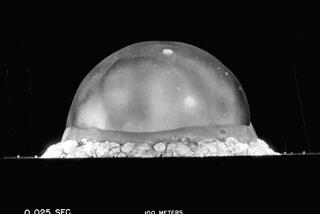A Date That Will Live in Infeasibility
- Share via
Armageddon took place 80 years ago. The world didn’t end.
Action began at 4:30 a.m., Sept. 18, 1918. There were 45,000 attackers, 8,000 defenders. Four hundred cannons smashed the walls. Cavalry dashed through. Hordes of infantry followed. Aircraft strafed fleeing troops.
British, French and Indian fighters overwhelmed their enemies at Megiddo--the “Armageddon” of the Bible.
A week later, the advance on Damascus began. Remaining resistance crumbled. It was the finish of the Ottoman Empire. It was the beginning of the Middle East as we now know it.
If it was the end of the world, everyone missed it.
Actually, the world ended something more than three years ago. Nobody noticed.
Other true believers can’t hold a candle to those with blind calendar faith. Never question what year it is. Never wonder about piling years on years on years. Don’t doubt where to start even if you are counting down to a 2000-year terminal bang.
Were George Washington alive today, he might be stumped to tell us his birthday. He knew what day family, friends and neighbors thought it was: Feb. 11, 1731. Most people on Earth would have given a different date.
It wasn’t just that many of the world’s peoples use calendars from other traditions, such as the Chinese, or other religions, such as Islam. Almost all Christians, except in places under British rule, didn’t think the day George was born was Feb. 11, 1731, either.
Their calendars reflected a corrective decree issued by Pope Gregory XIII about 200 years earlier.
The calendar so rejiggered is called “the Gregorian Calendar.”
In 1752, the British realm (including the American colonies) finally went along. Eleven days were erased by making Sept. 14 come immediately after Sept. 2.
Projecting that back to when George came into the world, we come up with Feb. 22, 1731.
New Year’s Day got changed, too. Our first Jan. 1 New Year’s Day ushered in 1753. Before then, American colonists moved on to another year each March 25.
Running the change back to Washington’s birth puts it in 1732 instead of 1731. So, which is it, George: Feb. 11, 1731, or Feb. 22, 1732?
Getting years precisely is a chore. “Leap days,” “leap years” and “leap centuries” are tinkering. We try to sop up extra bits before they become days that steadily shift everything out of whack. What Pope Gregory did was useful, but it was, after all, a one-time fix.
If pinning down the birthday of the father of our country is complicated, imagine what it is like to compute Jesus’ birthday. Yet, for some, that has to be the day on which millenarian countdowns begin.
It isn’t just that many Western Christians celebrate Christmas a full week before the new year. What’s seven days when a case can be made for Jesus being born in, say, 4 B.C.?
All other calculations being reasonably right, the 2000th Year End of the World probably took place some day within a 1995-96 time frame.
Boom! Poof! Why did no one pay attention?
More to Read
Sign up for Essential California
The most important California stories and recommendations in your inbox every morning.
You may occasionally receive promotional content from the Los Angeles Times.













